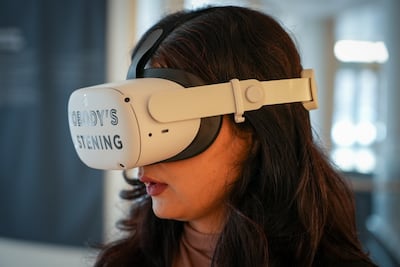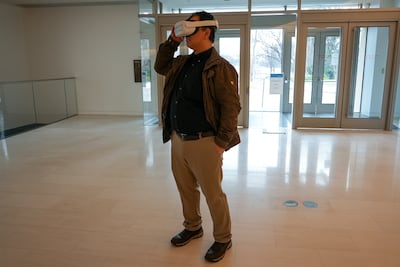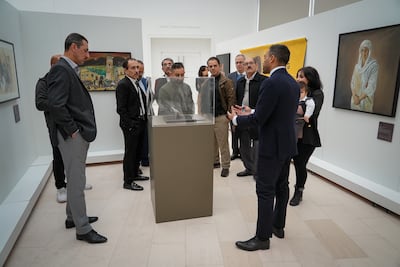The virtual reality headsets here come with a warning.
“We strongly recommend, if you are someone who has experienced the crimes committed by ISIS, that you do not take part in this,” Ryan D’Souza tells a group of Yazidi visitors before they try on the headsets.
“That is especially true for survivors of sexual violence.”
Bulky, white and labelled with the words “Nobody’s Listening”, the headsets take those wearing them to Sinjar in Iraq, where ISIS terrorists committed harrowing acts against the Yazidis in 2014.
Mr D’Souza is the founder of Nobody’s Listening, an immersive exhibition created to generate international awareness around the plight of the Yazidis in Iraq.
About 5,000 people were killed during the Yazidi genocide and many remain missing.
So realistic is the VR element that Mr D’Souza worked with a clinical psychologist and human rights lawyer to make sure the exhibition prioritises the welfare of survivors.
Despite his warning to the Yazidi guests, who are visiting the travelling exhibition at the United States Institute for Peace (USIP) in Washington, they begin to test out the technology.
Dejin Khidir, 35, who is visiting the exhibition from the state of Virginia, passes her young son to a family member before placing a headset over her eyes and tightening the straps at the back.
She stands in silence in the spacious and echoing hall while watching the presentation, occasionally walking back and forth as she interacts with storylines.

“It was terrifying to put yourself in that situation,” she tells The National.
“You actually feel like you are in their houses … it was so touching.”
The roughly 13-minute story was created from the accounts of survivors of the genocide, including prominent Yazidi activist Nadia Murad, who won the Nobel Peace Prize in 2018 for her efforts to end sexual violence in war.
Viewers watch difficult scenes, such as a young Yazidi girl being snatched from her mother by shadowy figures. Another is forced to work as a slave. There are destroyed temples and displaced families who have spent almost a decade living in a refugee camp.
“It took me back to the days when the genocide happened,” says Dakhil Elias, another Yazidi visitor. “Not only did it show me what happened, it took my mind and my heart there.”

The experience also comes with a message.
Mr D’Souza, who has demonstrated the exhibition in Iraq’s Parliament, aims to bring the plight of Yazidis back into focus and hold ISIS fighters accountable for their crimes.
“Only a handful of governments around the world have recognised the crime of genocide against the Yazidis,” he says.
“Our hope is that we’ll have international recognition by all governments by the time of the 10th anniversary in August of this year.”
A decade later, hundreds of thousands of Yazidis are still displaced due to the conflict and succeeding Iraqi governments have failed to rebuild Sinjar.
Many are living in refugee camps, mostly inside Iraq, unable to return home.
“The impact on this community has been devastating,” said Sarhang Hamasaeed, an Iraq expert at the USIP.
“The Yazidis need to go home, they need to rebuild their areas and unless those things happen, they will continue to suffer.”

Outside of the VR experience, Nobody’s Listening showcases work from Yazidi artists as well as items that were discovered after ISIS was driven from Sinjar.
Encased in a glass box is a dusty woman’s shoe, likely lost as thousands tried to escape the ISIS onslaught.
Ms Khidir said she hoped the world does not forget about what happened to the Yazidis and called on the international community to bring an end to their suffering.
“The human crisis is still ongoing,” she said.

